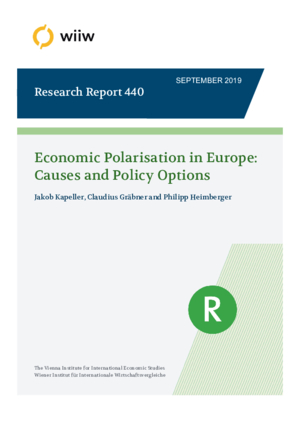Economic Polarisation in Europe: Causes and Options for Action
Claudius Gräbner, Philipp Heimberger and Jakob Kapeller
wiiw Research Report No. 440, September 2019
49 pages including 1 Table and 14 Figures
This study discusses the challenges that economic policy-makers in Europe have to cope with, in order to ensure an economically prosperous and institutionally stable community of Member States of the European Union (EU). At the analytical level, we not only document a process of multi-dimensional polarisation of EU countries, but also link the existing economic divergences with a central long-term problem, namely structural polarisation: differences in the institutional and legal embedding (e.g. in the areas of tax and corporate law, the labour market or the financial sector) and in technological capabilities are a major driver of divergence in living standards between some Member States. This polarisation, which started even before the financial crisis but has intensified over the last ten years, is due largely to the global and the European ‘race for the best location’.
Without coordinated and cooperative intervention by economic policy-makers, a further drifting-apart of economic development paths seems unavoidable. The large differences in the production structures of the EU countries and the resulting highly unequal distribution of technological capabilities are self-reinforcing in nature, and will further intensify polarisation.
The present study provides proposals for a coherent European overall strategy that not only addresses existing problems and renders possible the often-promised upward convergence between EU countries, but also provides a potential basis for dealing with key future challenges (such as digitisation, ageing society, climate change or global trade) on the basis of common European objectives. The focus is on safeguarding and expanding European values and institutions, in order to deepen European integration at key points; and thus also to contribute, in the medium to long run, to a transformation of the global economic order from the European side. A central argument is that coordinated measures in various policy areas – especially in wage, monetary, fiscal and industrial policy – are of central importance in creating a long-term successful economic basis for the common European economic and monetary area.
Disclaimer:
The study was first published by the Friedrich-Ebert-Stiftung in German language (‚Wirtschaftliche Polarisierung in Europa: Ursachen und Handlungsoptionen‘ by Jakob Kapeller, Claudius Gräbner, Philipp Heimberger, ISBN 978-3-96250-376-5, Bonn, 2019). The German version of this study was financed by the FES under the project "Für ein Besseres Morgen".
Keywords: Europe, European integration, economic openness, competitiveness
JEL classification: B5, F6, F45
Countries covered: European Union
Research Areas: Macroeconomic Analysis and Policy, International Trade, Competitiveness and FDI
